|
 Secure Site
Secure Site
|
 |
Archive for the 'sleep' Category
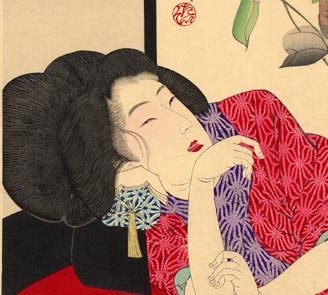 How to get that Elusive Good Night's Sleep - Tsukyoka Yoshitoshi 1888 Stanford’s Dr. Clete Kushida, president of the American Academy of Sleep Medicine, who has worked in the field of sleep research since 1977, offers these tips to a better night’s sleep:
Maintain a regular schedule, getting to bed and rising at the same time as consistently as possible each day, selecting the number of hours of sleep that make you feel best, whether it’s seven hours or 10.
Use bright light within five minutes of waking, for 30 minutes, to synchronize your internal clock.
Avoid bright light two to three hours before bedtime, which delays sleep onset. If you read, get just enough light to read and avoid halogen.
Avoid remaining in bed if you can’t sleep. After 20 minutes, if you can’t sleep or fall back asleep, go into another room and do something else until you feel drowsy.
Avoid reading or watching TV in bed (especially thriller novels or action shows) unless it makes you drowsy.
Avoid napping, unless you nap every day at the same time for the same amount of time or you are tired and about to get behind the wheel of a car.
One of the ultimate Zen like experiences is waking-up from a great slumber refreshed and energized. Your mind and body are harmoniously one, both alert and focused. Having a refreshed mind and body are two keys to a natural and Zen lifestyle. Waking up in the morning should not be a loud and abrupt awakening, but rather it should be a peaceful positive experience. The right natural alarm clock can transition your deep and tranquil sleep into a serene start to consciousness. Imagine a long-resonating Tibetan bell-like chime waking you up to a beautiful morning experience.
The right alarm clock can be the most beneficial investment for you. With our Now & Zen natural alarm clock you are awakened more gradually and thus more naturally. Now & Zen is focused on creating a naturalistic lifestyle, and our clocks are an example of our philosophy.
adapted from SFgate.com
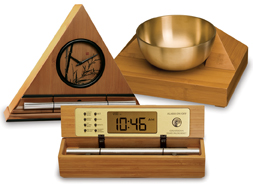 Waking up in the morning should be as pleasant as falling asleep at night. The Zen Alarm Clock's gradual, gentle awakening is transformative. Now & Zen’s Gradual Chime Alarm Clock Store
1638 Pearl Street
Boulder, CO 80302
(800) 779-6383
Posted in Chime Alarm Clocks, sleep, Sleep Habits, Zen Alarm Clock, Zen Timers
 how knowing your dosha can help you avoid sleepless nights Sleep is natural to life—just look at how well babies do it—and any problems we encounter should have a natural solution. Our inner sleep rhythm should connect to the rhythms of nature, or more specifically of daylight. Normally, as daylight fades, the body’s biological clock triggers the release of melatonin from the pineal gland, making us feel sleepy. The onset of morning light triggers a drop in melatonin, causing us to wake up.
Yet if sleep is so natural, why do an estimated 75 percent of Americans develop sleep problems? Probably because our lifestyles have become so un-natural. Late nights, evening computer- and cell-phone use, and sleeping late all alter this natural pattern of melatonin secretion. Add alcohol and caffeine consumption and late-evening meals to those years of cumulative abuse, and you end up with chronic sleep problems. To top it off, melatonin production tends to decrease as we age, further reducing the quality of our sleep.
Ayurveda considers sleep to be one of three key pillars of health. It recognizes the role of biological rhythms and identifies six time periods throughout the day that affect sleep by affecting our doshas—the three fundamental processes that guide our body’s functioning. The doshas include mind and movement (vata), metabolism (pitta), and structure (kapha). To improve sleep, ayurveda suggests going to bed before 10 p.m., during the cycle dominated by the heavy, slow-moving kapha dosha, when you naturally feel more mellow and sleepy. If you go to bed then, you’ll fall asleep easier and your sleep will be deeper.
The other pivotal point in the daily cycle occurs at 6 a.m. If you wake up before then, during the time of the morning dominated by quick moving vata dosha, you should have more clarity and dynamism.
As you and your husband illustrate, not everyone suffers from the same sleep problem. If your mind is whirling, your body tense, and you can’t fall asleep, chances are you have a dominant vata dosha. Your husband’s sleep problem on the other hand, waking up between 2 a.m. and 4 a.m., usually stems from a disturbance in the hot pitta dosha. People who sleep eight hours but still feel exhausted commonly have an excess of the slow, heavy kapha dosha. In each case, it’s important to balance the dominant tendency with diet and lifestyle choices.
Ayurvedic Sleep Aids
If you have trouble falling asleep (vata)
•Go to bed before 10 p.m., earlier in winter.
•Rub warm olive oil on your head and feet right before bed to calm an overactive mind.
•Avoid caffeine, raw foods, crackers, cold cereal, and other dry, light foods that aggravate vata dosha.
•Avoid TV, intense phone conversations, and exercise after 9 p.m.
•Choose quiet evening activities to wind down, such as washing dishes, folding clothes, and other simple tasks.
If you wake up between 2 a.m. to 4 a.m. (pitta)
•Avoid computer use and other work at night. Organize a to-do list to get a head start on the morning and settle your mind before bed.
•Avoid arguments or controversial discussions at night.
•Take an evening walk to clear your brain and cool your body.
•Avoid spicy or fried foods at night.
•Eat a juicy pear every day to cool the hot pitta dosha.
•Drink warm milk flavored with cooling organic rose syrup before bed.
•Rub your head and feet with coconut oil before bed.
If you feel exhausted after a good night’s sleep (kapha)
•Eat a light soup with whole-grain crackers or steamed vegetables for your evening meal.
•Flavor your food with digestion-stimulating spices, such as fresh ginger, cumin, and black pepper.
•Avoid meat, cheese, potatoes, and heavy desserts at supper, as these tend to clog the tissues, promoting snoring, apnea, stiffness, and morning lethargy.
•Make an effort to get up before 6 a.m.
•Exercise daily, if possible during the morning kapha cycle between 6 a.m. and 10 a.m.
Our Zen Timepiece’s acoustic 6-inch brass bowl-gong clock is the world’s ultimate alarm clock, practice timer, and “mindfulness bell.”
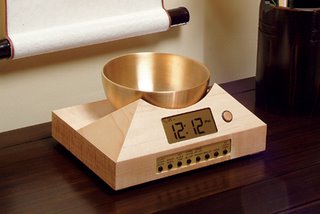 Singing Bowl Clock - Gradual Clock - with Progressive Gongs
It fills your environment with beautifully complex tones whenever it strikes. In the morning, its exquisite sounds summon your consciousness into awakening with a series of subtle gongs that provide an elegant beginning to your day. Once you experience the Zen Timepiece’s progressive awakening, you’ll never want to wake up any other way. It also serves as the perfect meditation timer. Available in 5 wood styles, including bamboo.
adapted from Natural Solutions Magazine, September 2006 by Nancy Lonsdorf
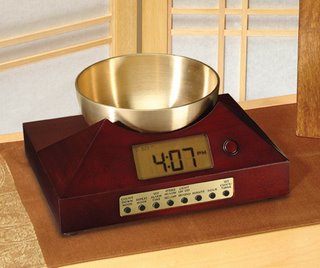 Tibetan Chime Clock with Brass Bowl Gong Now & Zen’s Gradual Clocks
1638 Pearl Street
Boulder, CO 80302
(800) 779-6383
Posted in Now & Zen Alarm Clocks, sleep, Sleep Habits
 Procrastinator Sleep Type: The Procrastinator
You get tired early in the evening, but by the time you go to bed, you’re wide awake.
What’s Going On?
Our bodies have two different mechanisms, one for sleep and one for wakefulness. Paul Glovinsky, Ph.D., coauthor of “The Insomnia Answer,” calls them the sleep drive and the alerting force, respectively. The problem is, these two forces can often be at odds with each other.
“The sleep drive depends on the fact that we’ve been up for a certain amount of hours, building the need for sleep,” he says. The longer we’re awake, the more intense it gets. But napping early in the evening or zoning out while watching TV can partially satisfy that sleep drive — so come bedtime, the alerting force has the upper hand, making it hard to nod off. For many people, adds Rubin Naiman, Ph.D., director of Sleep Programs at Miraval Resort, there’s “an ideal window of opportunity for falling asleep.”
What to Do
For starters, be aware of your sleep drive. If you feel yourself starting to doze off in the early evening — at dinner, for instance, or while reading or watching TV — get up and walk around. “It doesn’t take a lot. You don’t have to get up and run a mile,” explains Charles Atwood, Jr., M.D., associate director of the Sleep Medicine Center at the University of Pittsburgh Medical Center. “Just walk around your house a little bit. Usually that’s enough to keep you alert for another hour or so.”
However, if you feel yourself getting tired later in the night (say after 9 p.m. or so), don’t force your body to burn the midnight oil unless you really have to. As Bala Manyam, M.D., a neurologist and Ayurvedic expert, puts it, “Mother Nature is telling you, ‘You silly human being. You’re tired. Go to sleep now.'”
Waking up in the morning should be as pleasant as falling asleep at night. The Zen Alarm Clock’s gradual, gentle awakening is transformative.
“The Zen Alarm Clock,” uses soothing acoustic chimes that awaken users gently and gradually, making waking up a real pleasure. Rather than an artificial recorded sound played through a speaker, the Zen Clock features an alloy chime bar similar to a wind chime. When the clock’s alarm is triggered, its chime produces a long-resonating, beautiful acoustic tone reminiscent of a temple gong. Then, as the ring tone gradually fades away, the clock remains silent until it automatically strikes again three minutes later. The frequency of the chime strikes gradually increase over ten-minutes, eventually striking every five seconds, so they are guaranteed to wake up even the heaviest sleeper.
Adapted from Body + Soul Magazine, May 2008 by Sarah Schmelling
Boulder, Colorado—an innovative company has taken one of life’s most unpleasant experiences (being startled awake by your alarm clock early Monday morning), and transformed it into something to actually look forward to. “The Zen Alarm Clock,” uses soothing acoustic chimes that awaken users gently and gradually, making waking up a real pleasure. Rather than an artificial recorded sound played through a speaker, the Zen Clock features an alloy chime bar similar to a wind chime. When the clock’s alarm is triggered, its chime produces a long-resonating, beautiful acoustic tone reminiscent of a temple gong. Then, as the ring tone gradually fades away, the clock remains silent until it automatically strikes again three minutes later. The frequency of the chime strikes gradually increase over ten-minutes, eventually striking every five seconds, so they are guaranteed to wake up even the heaviest sleeper. This gentle, ten-minute “progressive awakening” leaves users feeling less groggy, and even helps with dream recall.
 Natural Awaking Clock with Chime Sounds Now & Zen’s Alarm Clock and Meditation Timer Store
1638 Pearl Street
Boulder, CO 80302
(800) 779-6383
Posted in Bamboo Chime Clocks, Chime Alarm Clocks, Natural Awakening, Now & Zen Alarm Clocks, sleep, Sleep Habits
 what do our dreams mean? Your nighttime revelries could hold the key to your health.
By Jeanne Ricci
It has happened to all of us: You sit up in bed after a doozy of a dream and wonder What did that mean? Mankind’s fascination with dreams has a long history. In fact, one of the world’s oldest surviving documents, an Egyptian papyrus, contains dream interpretations. Most ancient cultures believed dreams were communications from deities or departed souls. More recently, psychologists Sigmund Freud and Carl Jung paved the way for using dream analysis when treating patients, believing dreams could shed light on the workings of the unconscious mind. Today, many medical and psychiatric professionals believe dreaming can help us move beyond depression and grief and even identify underlying health issues.
As long as you are sleeping, you are dreaming. That’s right, everyone dreams—even if you don’t remember your nightly adventures. “Most dreams occur during REM (rapid eye movement) sleep, which replenishes certain neurotransmitters,” writes Deirdre Barrett, PhD, assistant professor of psychology at Harvard Medical School, in her book The Committee of Sleep (Crown, 2001). Since you enter the light sleep stage characterized by REM every 90 minutes, you’ll likely have four to five dreams a night, assuming you sleep for eight hours. “Interfering with REM, and thus dreaming, interferes with creativity, problem-solving capability, memory, and, in extreme situations, even immune function and body temperature,” says Barrett. You don’t have to remember your dreams to reap some of the benefits, but if you can recall them, your dreams could tell you a lot. (For tips to enhance dream recall, see “To Dream, Perchance to Remember” on page 73.) “But stay away from dream dictionaries that would have you believe that one symbol means one thing,” Barrett warns. Instead, she recommends Our Dreaming Mind by Robert L. Van de Castle (Ballantine Books, 1995), which focuses on dream theory and learning to work with your dreams. If you really dive deeply into your dream life, the payoff is multifold. You can tap into more clarity and creativity, feel less depressed and stressed, and maybe even be able to predict disease.
Tap into your dream tank
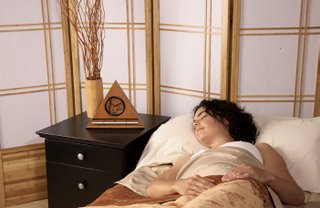 zen clocks help remind you of your dreams With a little effort, you can draw creative inspiration for both your professional and personal life from dreams. Need help solving a problem at work or making a decision for your household? Dreams can shed light on information stored in your brain and also help you think outside the box. “If you are stuck in your waking life on any sort of issue, then dreams can help you come to a resolution,” says Barrett. In fact, artists, writers, and philosophers such as René Descartes and Samuel Taylor Coleridge have used a method called dream incubation to nurture their creative processes.
To get started incubating dreams, write a question such as Which apartment should I rent? or How can I increase productivity at work? on a piece of paper and place it by your bed. Review the question before going to sleep and tell yourself you want to dream about it. Keep a pen and paper on the nightstand. For the next several nights, every time you wake up, lie quietly and try to recall your dreams. Write down anything you remember—events, places, characters, and feelings. The answer to your question may appear obvious after one night, or it could come to you over time as you piece together recurring ideas and themes. As with anything, the more you practice incubating and analyzing dreams, the more insight you’ll draw.
The blues are but a dream
 Hiroshige, The Moon Over a Warterfall An active dream life can help you shake the blues. Research conducted at Rush Presbyterian St. Luke’s Medical Center in Chicago found that people who were depressed after a divorce felt better more quickly if they had, and were able to recall, both good and bad dreams about their ex-spouses. Rosalind Cartwright, PhD, director of the research program, and her colleagues found that as dreams involving an ex-spouse became less negative and less frequent, their subjects’ depression lifted. This is not to say that people who don’t remember their dreams are more likely to be depressed—but people who do remember may recover more quickly from traumatic events such as divorce.
Similarly, people suffering from post-traumatic stress disorder (PTSD) are often encouraged to use dreams to aid their recovery. PTSD sufferers commonly have nightmares about real events that prolong their trauma. If they can successfully redirect a negative dream and change its outcome via hypnosis or self-suggestion at bedtime, it not only stops the nightmares but also lessens other symptoms, like heightened startle responses and daytime flashbacks, says Barrett. This method can also quash recurring nightmares for people who don’t have PTSD. Throughout the day and before bedtime, think of the dream and vividly imagine a more positive outcome. With determination, you can eventually change the content of your nightmare.
The interpreter of maladies
Is your body trying to tell you something? “Someone might dream she has cancer or some disease and then later see the first clinical sign of it,” says Barrett. The idea that our subconscious knows about illness before our conscious mind goes back to Hippocrates. Our body, it seems, often sends early warning signals that don’t always reach our consciousness. When we sleep and dream, the sensory overload that’s now part of everyday life gets blocked, making our psyches more receptive to messages our bodies send.
Shanee Stepakoff, a clinical psychologist in New York City, experienced this firsthand. “I had a mark on my cheek that looked like a freckle. I asked a few different dermatologists about it, and they all said it was nothing, but I kept having dreams about it,” she says. Stepakoff continued to see cancer metaphors in her dreams. “Finally, I had a very intense dream in which the word check kept appearing in various contexts (checkbook, write a check),” Stepakoff says. She believed this was her psyche urging her to get the spot on her cheek checked. Her doctor didn’t want to do a biopsy, but she insisted. Sure enough, it came back as melanoma—luckily, they caught it in time.
“I believe that the psyche gives us messages when there is something important that we need to pay attention to—it could be about our health, but it could also be about a relationship, a person in our lives, or a job situation,” says Stepakoff. “I think it is part of how our psyches help us survive and, ideally, to become more whole.”
Jeanne Ricci is a writer living in New York City.
To Dream, Perchance to Remember
It’s hard to learn from your dreams if you can’t remember them. But even if you draw a blank every morning, don’t fret. Follow these steps, recommended by Deirdre Barrett, PhD, assistant professor of psychology at Harvard Medical School, and Andrew Holecek, a dream workshop teacher at Colorado’s Shambhala Mountain Center, to enhance your dream recall.
* Get seven to eight hours of sleep a night. The more you sleep, the more dreams you will have, increasing the likelihood you’ll remember one of them.
* Throughout the day and right before you fall asleep, remind yourself of your intention to remember your dreams.
* Keep a pen and paper by your bed. A dream journal can encourage recall and, at the very least, help you document any fragment you do remember upon waking.
* When you first wake up, don’t move. Lie quietly and reflect on any image that comes to mind. Sometimes a whole dream scenario will come back to you.
* Be mindful during the day, not just about dreams but about everything going on around you. The lucidity you cultivate in waking life will translate to your dream life.
* Set an alarm to wake you every two hours throughout the night. When the alarm sounds, write down as much as you can remember about the dream you were just having.
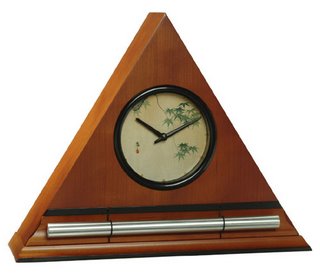 Zen Alarm Clocks for a Soothing Wake-up Now & Zen Headquarter Store
1638 Pearl Street
Boulder, CO 80302
(800) 779-6383
Posted in Chime Alarm Clocks, sleep, Sleep Habits
 Eat right to sleep tight
By Ellen Kamhi PhD, RN, AHN-BC, AHG and Lynn Allison
Can’t sleep through the night? If you find yourself tossing and turning instead of sleeping soundly, you are not alone. Experts say that at least once in our lives, most of us will suffer from severe insomnia. But before you reach for the over-the-counter sleeping aids, try an all-natural approach to catch those Zs.
“Chronic insomnia—defined as difficulty initiating or maintaining sleep three times or more per week for a period of one to three months—affects about 10 to 15 percent of all adult Americans. This number increases with age: studies of people over 65 have shown that as many as 40 to 50 percent of senior citizens suffer from chronic insomnia.”
To combat this, there are many proven lifestyle strategies to cope with insomnia, from increasing your daily exercise to making your bedroom a sanctuary for sleep. According to a news release from Northwestern University Sleep Foundation, people suffering from chronic insomnia who exercised aerobically four times per week—for only 20 minutes each session—reported better sleep quality, fewer symptoms of depression, more energy, and less sleepiness during the day.
But what you eat can also be a powerful medicine to fight insomnia. Eating certain types of food during the day and especially at dinner, can ensure a sound night’s sleep, says Dr. Aaron Tabor, of Kernersville, North Carolina, who is an expert on how the body metabolizes nutrients.
 how to get a good night's sleep “The amino acid, tryptophan, is nature’s natural sedative,” he says. “By eating a light dinner of foods rich in tryptophan along with a small amount of carbohydrate, you allow the body to release serotonin, a brain transmitter that makes you calm and sleepy.”
Dr. Michael Breus, a clinical psychologist with a specialty in sleep disorders and author of Beauty Sleep: Look Younger, Lose Weight and Feel Great Through Better Sleep (Plume 2010), adds that your bedtime snack should be eaten about 90 minutes before lights out.
“Your body doesn’t digest foods lying down well, so even if you nod off, you may find you have gastrointestinal upset that will wake you up,” says Breus. Tryptophan is more of a sleep regulator than sleep inducer, so the best way to help your body’s sleep schedule is to plan your daily meals to accommodate how your body digests fatty foods, carbohydrates, proteins and fluids—all of which pass through the body at different rates.
Tryptophan is an essential amino acid. It’s called essential because the body cannot manufacture it, so we have to get it from the foods we consume. Tryptophan is converted in the liver into vitamin B3 or niacin, which is important for all neurologic functions, including mood balance, relaxation, and sleep. In order to support maximum tryptophan absorption, its best to consume tryptophan-containing foods on an empty stomach along with a small amount of healthy carbohydrates.
When you eat carbohydrates along with a protein food that is high in tryptophan, the carbohydrates initiate the release of insulin by the body. Insulin tends to clear most amino acids, but tryptophan is not affected by insulin. Therefore, more tryptophan is able to reach the brain since it is not competing with other amino acids to cross the blood-brain barrier. This can then significantly increase serotonin, which in turn helps the pineal gland to manufacture melatonin. This is essential for healthy sleep.
Research also shows that getting enough sleep—about eight hours for most folks—can help you lose weight three times faster than simply lying awake in bed.
“People who get enough sleep are less likely to crave sweets and highcarbohydrate snacks to keep them awake,” explains Breus. He points out that getting a good night’s rest ensures the hormones leptin and ghrelin work efficiently to regulate your appetite and hunger. Ghrelin triggers your impulse to eat, while leptin sends a signal to the brain that you are full.
 what to eat before falling asleep “When you don’t get enough sleep, the leptin levels decrease and you don’t feel satisfied when you eat,” says Breus, who is also a faculty member of the Atlanta School of Sleep Medicine.
Of course, practicing good sleep habits can also help you catch your Zs. Going to bed the same time every day, avoiding conflict, caffeine, and alcohol in the evening, and even using aromatherapy or a sound machine can all help you fall asleep faster.
Making breakfast your biggest meal of the day, while avoiding high-sugar cereals or high-fat concoctions, will help you start the day on the right foot. You can determine the sugar and fat content of breakfast cereals by reading the Nutrition Label and Ingredients. Sometimes, this can be surprising.
Even some organic cereals have “organic cane sugar” as the second ingredient on the label. Since the ingredients are listed in descending order, the second ingredient indicates a relatively high amount. On the other hand, an old-fashioned cereal such as Uncle Sam Toasted Whole Wheat Berry Flakes & Flaxseed Original Cereal is not certified organic, but is much lower in sugar and higher in whole grains and protein—a much better choice. Uncle Sam’s would also work well for a sleep-supporting evening snack. If you are choosing an oatmeal, stick with the plain, unflavored variety. Even if it is organic, flavored oatmeal will usually contain sugar and other ingredients you just don’t need.
Lunch can be a sandwich or a salad with protein to help you get through the afternoon. Dinner should have protein as well as complex carbohydrates and needs to be eaten four hours before bedtime. If breakfast is not your largest meal, you can use lunch as your main meal for the day, and use the evening meal as a light snack. Miso soup and whole grain, wheat-free bread or organic rice cakes are a good choice. Lundberg Wild Rice Cakes with organic almond or peanut butter is the perfect high tryptophan sleep supportive snack to eat at night, accompanied by Sleepytime Tea. This gives you time to metabolize your food. The best bedtime snack is one that contains complex carbohydrates, protein, and calcium. Calcium helps the brain use the tryptophan to manufacture melatonin.
Dairy foods, that contain both tryptophan and calcium, are one of the top sleep friendly foods, says Breus. And by combining carbohydrates together with a small amount of protein, your brain makes serotonin, known as the calming hormone.
Food Allergy Connection
Research is continuing to uncover a myriad of suspicious symptoms that are being linked to individual food sensitivities and allergies, including mood imbalances and insomnia. Common allergens that might be the culprit include wheat and dairy products. Try giving them up for six days and monitor your response. Although dairy can be a useful relaxant for most individuals, it may have the opposite effect for someone who is lactose intolerant or dairy sensitive.
Limit Caffeine
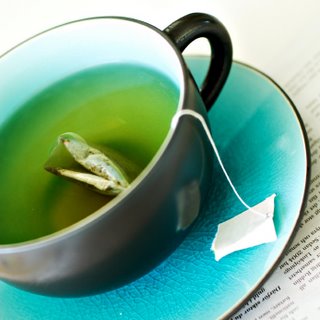 eliminate caffeine before bedtime so that you can sleep soundly Caffeine is a stimulant alkaloid molecule that naturally occurs in many plants that are used for food and beverages. These include coffee, tea (yes, even green tea), and chocolate. Many pharmaceutical drugs and soft drinks are also high in caffeine, as well as popular ‘energy shot drinks.’ Consumer Labs (consumerlabs.com) evaluated 5 Hour Energy, a popular energy shot drink, and found:
“5-Hour Energy…notes that the amount of caffeine is comparable to that in a cup of ‘leading premium coffee.’ ConsumerLab.com found the 2-fluid-ounce bottle to contain 207 mg of caffeine. However, this is 15 percent higher than what you would get from a ‘short’ cup (8 fluid ounces) of a premium coffee such as Starbucks, which Starbucks claims to have 180 mg of caffeine.”
Since the effects of caffeine can last up to 20 hours, having an innocent cup of coffee or energy shot drink, even early in the day, can seriously interfere with sleep, especially for a caffeine sensitive individual. Choose organic decaf coffee or herbal tea instead.
Ellen Kamhi PhD, RN, AHN-BC, AHG, The Natural Nurse®, is a medical school instructor, author and radio/TV host. She has been actively involved in natural medicine since 1964.
 Soothing Chime Alarm Clocks with Acoustic Sounds Lynn Allison is an author, 30 year veteran reporter in the health and fitness field and writes weekly for several national publications.
Now & Zen’s Alarm Clock Shop
1638 Pearl St.
Boulder, CO 80302
(800) 779-6383
Posted in sleep, Sleep Habits
 sleep and wellness
You have the power to impact your own health and well-being. The actions we take, the choices we make, the way we think, the way we act or react to situations, and the way we move through life all impact our health and wellness more than we may realize. There are shifts you can make in how you think and act that will affect the overall quality of your life.
Routine daily activities we take for granted can impact our health and wellness. The beauty of these activities is that we do not need a medical or healthcare practitioner to pre- scribe them. Two such activities that you can use to impact your health and wellness are movement and sleep.
Movement and exercise
The World Health Organization (WHO) defines physical activity as any bodily movement produced by skeletal muscles that requires energy expenditure.
According to WHO, physical activity reduces the risk of coronary heart disease, stroke, type 2 diabetes, colon cancer, and breast cancer in women. There is even evidence to suggest that increasing levels of various types of physical activity may benefit health by reducing hypertension, osteoporosis, and risk of falls; improving body weight and composition; and decreasing the incidence of musculoskeletal conditions such as osteoarthritis and low back pain.
WHO recommends 30 minutes of moderate-intensity physical activity five days per week to improve and maintain health; the 30 minutes can be accumulated over the course of a day in blocks as short as ten minutes.
 yoga as exercise We tend to think of exercise as running, playing a sport, swimming, using workout equipment, or some other activity that requires extensive physical exertion. There are other options that have benefits, including walking, low-impact exercise, or other mild fitness practices.
In addition to the conventional forms of exercise popular in the West, there is another type of activity that promotes wellness. In China there are two movement programs that have been used for thousands of years and are becoming very popular in Western cultures: t’ai chi and qigong. These programs impact not only the body but also the mind.
T’ai chi (pronounced tie chee) is an ancient program of gentle, slow, fluid movements and coordinated breathing. The movements are designed to stimulate the flow of the energy force (chi or qi) and to promote balance in mind and body. T’ai chi originated as a martial arts style and has been adopted as a movement program because of its health benefits.
The opening ceremonies to the 2008 Olympic Games in Beijing, China, included 2,008 t’ai chi experts demonstrating its graceful and fluid movements. In parks in China, it is common to see groups of people practicing t’ai chi in the morning.
Qigong (pronounced chee gung) is another ancient movement program based on gentle movements with coordinated breathing that includes visualization. It has been described as a self- healing art that, like t’ai chi, cultivates the energy force within us and plays an active role in maintaining health.
When gentle movements are integrated with full, relaxed breathing and deep relaxation of mind, the body enters an especially healing and restorative state. This has a positive effect on the blood, the nervous system, the immune system, and oxygen metabolism.
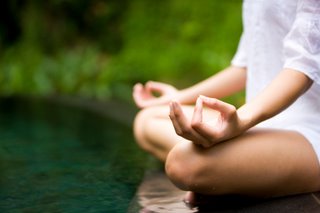 mindfulness practice Yoga is another practice that may serve you well. Yoga is a mind-body practice with origins in ancient Indian philosophy. The various styles of yoga that people use for health purposes typically combine physical postures, breathing techniques, and meditation or relaxation.
Sleep and Rest
Although getting adequate sleep and rest is essential to health and wellness, most people take it for granted. Your body has remarkable healing power, and rest and sleep play a large part in the healing process. When you don’t get enough, it impacts your body’s healthy functioning.
The National Sleep Foundation maintains that seven to nine hours of sleep per night is optimal for most adults and that sufficient sleep promotes overall health and alertness. Sleep debt is the result of not getting enough rest and can cause physical, emotional, and mental fatigue. Studies have shown that sleep loss impairs immune function and the healing process.
When we sleep, our blood pressure is lowered, hormones are secreted, kidney functions change, sensory and motor activities are relatively suspended, and the immune system is impacted. The hormones produced during sleep pro- mote growth, help build muscle mass, repair cells and tissues, and work to fight infections. Sufficient sleep not only pro- motes healing when you are ill or sick, but helps create a positive environment in your body which may reduce the occurrence or severity of disease or illness.
All bodies are unique in how much sleep they need to function optimally. Your body knows how much sleep you need and will be your teacher and alert you when you aren’t getting enough. What shows up in your body when you have had insufficient sleep?
The routine daily activities of moving and sleeping affect our health and wellness. Making a shift to recognize their potential and to make appropriate changes in these areas will have a positive impact.
The Digital Zen Clock’s long-resonating Tibetan bell-like chime makes waking up a beautiful experience – its progressive chimes begin your day with grace.
When the clock’s alarm is triggered, the acoustic chime bar is struck just once … 3-1/2 minutes later it strikes again … chime strikes become more frequent over 10 minutes … eventually striking every 5 seconds until shut off. As they become more frequent, the gentle chimes will always wake you up – your body really doesn’t need to be awakened harshly, with a Zen Clock you’re awakened more gradually and thus more naturally. Unlike artificial recorded sounds coming out of a tiny speaker in a plastic box, natural acoustic sounds transform your bedroom or office environment.
Marc Levin is the author of the recently re- leased book Eight Shifts for Wellness: Practical Transformative Steps to Enhance Health, Wellness, and Well- Being (Golden Nuggets Press, 2011). More information about him and the eight shifts is available at eightshifts.com.
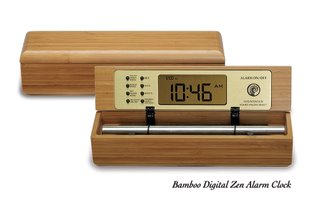 Gentle Chime Alarm Clocks and Yoga Timers Now & Zen’s Alarm Clock Store
1638 Pearl St.
Boulder, CO 80302
(800) 779-6383
Posted in sleep, Sleep Habits
 Morning meditation Sense the Stillness in the Morning
For yoga instructor Alison Novie, mornings make an ideal time for meditation — perhaps more than any other time of day. “The sun’s about to rise, but it’s still sort of dark and quiet,” says Novie, who wakes at 5:00 a.m. to meditate. “I get up, brush my teeth, light a candle, and then sit for half an hour. The calm energy I get from that morning meditation carries me through the day.”
You don’t have to be a regular yoga or meditation practitioner to reap the benefits of a morning meditation ritual. Start with five minutes daily, using the guidelines that follow. Set you Meditation Timer from Now & Zen for 5 minutes. Then over the course of a few weeks — or when you are ready — gradually work up to 10 minutes. Remember, with meditation it’s quality, not quantity, that matters.
Start with awareness. Rather than lunge out of bed, Novie suggests waking up slowly. “Spend a few minutes just becoming conscious of the sensations of your body. Awareness is such a beautiful way of entering your day.” Once you’re up, resist the temptation to check your e-mail, flip on the radio, or do any of the other countless things that draw you out of yourself and into the concerns of the world. Instead, keep the focus inward.
Find a comfortable spot. Practice your five minutes of meditation anywhere you like (the bedroom floor, a favorite chair) except the bed, where you may fall back to sleep. To enhance the sacred aspect of her meditation space, Novie set up a small altar in her living room that she uses only for meditation, giving the space a positive energy of its own. Be sure to set your Meditation Timer from Now & Zen for 5 minutes.
Sense your breath. Close your eyes. Feel your breath moving in and out of your body without controlling it. Bring your attention to the rise and fall of your abdomen or to the tip of your nose. The more awareness you bring to breath and body, the more grounded in your body you’ll become. This, in turn, will help relieve some of the stress that comes with getting through your morning.
Don’t try to block your thoughts. Your mind will wander — that’s what it’s designed to do. Rather than try to fight off thoughts as they emerge, acknowledge them, but don’t engage them. And give yourself some slack — meditation is, after all, a practice, not perfection.
Our Zen Timepiece’s acoustic 6-inch brass bowl-gong clock is the world’s ultimate alarm clock, practice timer, and “mindfulness bell.”
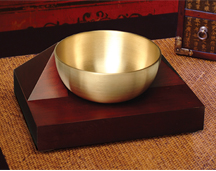 Meditation Gong Timer with Singing Bowl It fills your environment with beautifully complex tones whenever it strikes. In the morning, its exquisite sounds summon your consciousness into awakening with a series of subtle gongs that provide an elegant beginning to your day. Once you experience the Zen Timepiece’s progressive awakening, you’ll never want to wake up any other way. It also serves as the perfect meditation timer.
adapted from Body + Soul, March 2006
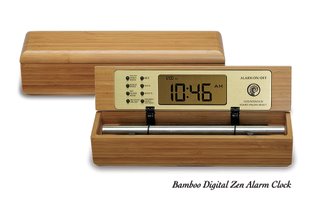
Now & Zen’s Clock Shop
1638 Pearl Street
Boulder, CO 80302
(800) 779-6383
Posted in Bamboo Chime Clocks, Chime Alarm Clocks, intention, Natural Awakening, Now & Zen Alarm Clocks, sleep, Sleep Habits
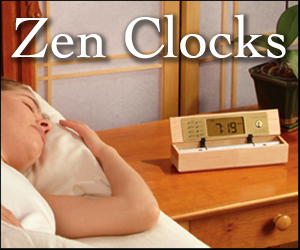 trouble waking up? Worry No More…
Boulder, Colorado—an innovative company has taken one of life’s most unpleasant experiences (being startled awake by your alarm clock early Monday morning), and transformed it into something to actually look forward to.
“The Zen Alarm Clock,” uses soothing acoustic chimes that awaken users gently and gradually, making waking up a real pleasure. Rather than an artificial recorded sound played through a speaker, the Zen Clock features an alloy chime bar similar to a wind chime. When the clock’s alarm is triggered, its chime produces a long-resonating, beautiful acoustic tone reminiscent of a temple gong. Then, as the ring tone gradually fades away, the clock remains silent until it automatically strikes again three minutes later. The frequency of the chime strikes gradually increase over ten-minutes, eventually striking every five seconds, so they are guaranteed to wake up even the heaviest sleeper. This gentle, ten-minute “progressive awakening” leaves users feeling less groggy, and even helps with dream recall.
 waking up happy Now & Zen’s Chime Alarm Clock Store
1638 Pearl Street
Boulder, CO 80302
(800) 779-6383
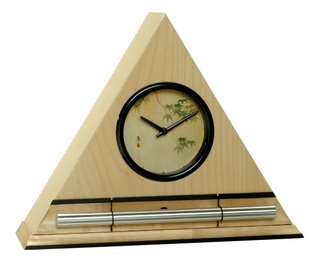 Peaceful Wake Up Chime Alarm Clocks
Posted in Natural Awakening, sleep, Sleep Habits
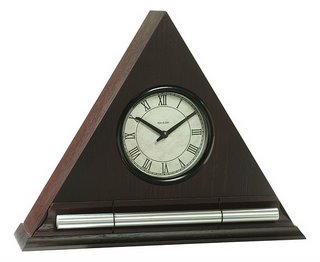 Just Say No to a Snooze Button, use a Zen Clock Just Say No to a Snooze Button
Most modern alarm clocks include a “snooze button” mechanism which allows the user to go back to sleep for a brief period after the initial alarm.
While this may make it easier for some people to “face the day,” here at Now & Zen we feel the whole concept of a snooze button is “all wrong.”
People want snooze buttons because they want to awaken gradually. And this is only natural because just as our bodies fall asleep gradually, our bodies also want to wake up gradually. However, with a regular, snooze button-equipped alarm clock the user is initially “startled awake” by the alarm, and then continually startled awake with each press of the snooze button. This is not the way to treat your body because it creates a kind of merry-go-round of multiple “rude awakenings.”
As an alternative we recommend using our Zen Alarm Clock, which wakes users gradually with a built-in 10 minute progression of gradually increasing acoustic chimes. It really is a better way to get up in the morning.
Zen Alarm Clocks make waking up a beautiful experience. And once you experience the Zen Clock’s gradual 10 minute chime progression, you will never want to wake up any other way again.
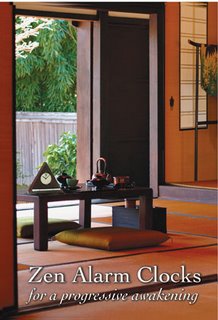 Zen Clocks are an Alternative to Snooze Button Clocks that Shorten Your Life! Now & Zen
1638 Pearl Street
Boulder, CO 80302
(800) 779-6383
Posted in Natural Awakening, sleep, Sleep Habits, wake up alarm clock
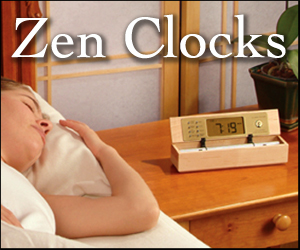 tranquil alarm clock Americans recently voted alarm clocks one of their most hated inventions—and it’s not difficult to understand why.
But it seems there is more reason to fear the alarm than to loathe it. For rather than just dragging you from slumber each morning, alarm clocks could actually be bad for your health.
You don’t need to be a doctor to appreciate that the sudden shrill of an alarm could be bad for your heart. And scientists have now proven that people who are suddenly forced awake by the sudden ringing of an alarm have higher blood pressure and heart rate than those who wake up peacefully.
Alarms can also add to your overall stress levels. The sudden noise triggers the body’s protective ‘fight or flight’ response, pumping up your adrenaline levels.
While this might be useful to get you to work on time, it can also lead to chronic stress which in turn contributes to high blood pressure, sleep problems and depression.
Now & Zen ® creates natural lifestyle products, such as their popular Zen Alarm Clock, that make a real difference in people’s lives. The growing preference for natural foods and natural fibers is carried forward by
Now & Zen® in the natural acoustic sounds and natural hardwood materials featured in every Now & Zen® product. With a wide selection of different styles, their unique alarm clocks wake you gradually and naturally. A series of beautiful acoustic chimes transforms your daily arrival into a tranquil beginning. Each timepiece combines beauty and versatility. These are high quality products that are not only modern and luxurious but are also peaceful and contribute to a stress-free day in an already stress filled world. Please visit their website to see these unique creations.
 Tranquil Alarm Clock with Gentle Chime Now & Zen – The Gradual Clock Store
1638 Pearl Street
Boulder, CO 80302
(800) 779-6383
Posted in Bamboo Chime Clocks, sleep
« Previous Page — « Previous Entries
Next Entries » — Next Page »
|
|
|
|